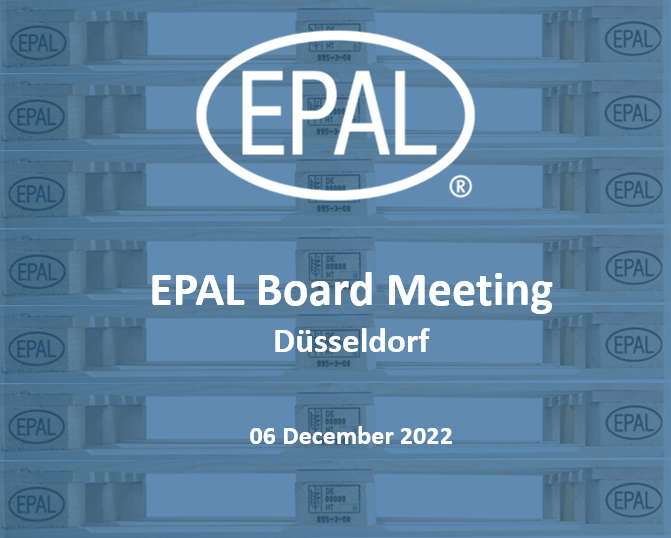EPAL Board meeting on 6 December 2022 in Düsseldorf
EPAL Board meeting on 6 December 2022 in Düsseldorf
The last Board meeting of 2022 of the European Pallet Association e.V. (EPAL) took place at EPAL International in Düsseldorf. The development of the EPAL Euro pallet pool in 2022 and the forecast for 2023 were at the heart of the Board meeting. Adapting the EPAL Technical Regulations to the demands of digitalising logistics was a particularly important theme.
At the end of a difficult year for Europe, the world and the pallet sector, the EPAL Board reviewed developments in the EPAL Euro pallet pool in 2022 whilst also considering EPAL’s future in 2023 and beyond.
The war in Ukraine has changed many things. Licensees in Ukraine and their employees have increased production of EPAL Euro pallets under the most demanding conditions and EPAL licensees in countries in the European Union have put particular effort into overcoming disruptions to the wood and nail supply chains. All EPAL licensees have worked together to make an important contribution to the resilience of the supply chains for retail and industry through the production and repair of EPAL Euro pallets.
Dirk Hoferer, President of EPAL:
“On behalf of the EPAL Board, I would like to thank all EPAL licensees and their employees for their important contribution to the success of the EPAL Euro pallet pool in 2022. The licensees have successfully dealt with the challenges of purchasing wood and nails and have met the huge demand for EPAL pallets from their industrial, retail and logistics customers. EPAL licensees and users of EPAL Euro pallets have once again proven to be one big EPAL family which stands together in difficult times.”
Representatives of member associations from nine European countries took part in the EPAL Board meeting. Reports on the development of the EPAL pallet pool in their countries mean new developments can be spotted early and be taken into consideration in EPAL’s plans.
Jarek Maciążek, President of EPAL:
“The benefits of being an international association with national member associations and their members from the timber industry have been proven in 2022. Information from all the countries and markets can be quickly and collaboratively evaluated with the producers and repairers of EPAL pallets from more than 35 countries in order to find the right solutions for the international EPAL pallet exchange pool. EPAL and its many licensees and users have overcome the challenges of 2022 by drawing on our shared experiences from the COVID-19 lockdown in 2020 and 2021 and the disruptions to supply chains.”
Members of the EPAL Board reported that there were no delays in supplying users with EPAL Euro pallets in any country. The more than 12 % increase in the production of EPAL Euro pallets in the first half of 2022 meant that the demand from industry and retail for exchangeable EPAL Euro pallets could be met in full in every European country. After a slight weakening in the demand for pallets since the summer due to the economic situation, the growth in the production of EPAL Euro pallets in October 2022 compared to the previous year was 8.5 %.
Jean-Philippes Gaussorgues, Vice-President of EPAL:
“In the spring of 2022, there were concerns that there might not be a sufficient number of EPAL Euro pallets available to meet demands from industry and retail due to disruptions to the wood, steel and nail supply chains. Through their exemplary commitment, EPAL licensees and their employees were able to avoid any such shortage of EPAL Euro pallets. Finally, at the end of 2022, we can say that deliveries of products and goods were not delayed due to an inadequate supply of EPAL Euro pallets. For us and all users of EPAL Euro pallets, this is a huge success.”
There was complete agreement amongst all participants in the Board meeting that EPAL must not sit back and relax following the success of 2022 and previous years. The EPAL Board has therefore made a start on the next big project and, by amending the EPAL Technical Regulations, has, amongst other things, laid the foundations for serialising EPAL Euro pallets by marking with a QR code. As a result of ongoing pilot projects, we expect a greater number of digital EPAL Euro pallets with a QR code to be available as early as 2023.
Bernd Dörre, EPAL CEO,
“The EPAL Euro pallet pool will arguably be the first major pallet exchange pool in the world to offer pallets with a unique QR code. The collaboration between EPAL and the producers of EPAL pallets as well as IT companies and inkjet printing system manufacturers has resulted in substantial technical advances in recent years which are particularly significant for all sectors of the timber industry and the wooden packaging industry. Users of EPAL Euro pallets will now have the opportunity, amongst other things, to identify an EPAL Euro pallet's location and payload by scanning the QR code and therefore to increase the efficiency of pallet logistics. The amendments to the EPAL Technical Regulations are the next step on towards the market launch of the digital EPAL Euro pallet.”
Supporting people in Ukraine remains an important consideration for EPAL at the end of 2022. As both EPAL International and many EPAL member associations have committed themselves to financing the delivery of aid since March 2022, the Board has made an amount of EUR 10,000.00 available for the purchase and donation of electrical generators. Several member associations have spontaneously joined the project and have also donated funds for the purchase of electrical generators which are to be donated to social causes.

